The Research Autopsy Program (RAP)
The Research Autopsy program arranges and performs autopsies to collect tumor and other tissues for researchers in many different areas. Specimens collected at autopsy have been used to grow living cell lines which can be used to evaluate for genetic mutations and test new chemotherapies. Samples can also undergo genetic sequencing and RNA expression analysis, as well as immunohistochemical and proteomic studies.
Research autopsies provide a completely unique opportunity to collect samples from multiple areas. Tumor samples can be taken for cancer or disease that has
- become locally aggressive
- developed resistance to treatment, and/or
- spread throughout the body
Multiple body sites can be sampled in large quantities and new sites of tumor spread can be found that were not detected during life; these areas can also be sampled for research.
Patients or family members sign the Study Consent for participation in the Research Autopsy program before the patient's passing. At the time of the death, the next-of-kin will sign an Autopsy Consent. Arrangements can be made to transport patients who pass away in hospice care or at home to the hospital by a funeral service at no cost to the family. Researchers also pay the cost of performance of the autopsy itself.
If you are a clinician and have a patient who is interested in participating in our program, click the button below to download the flowchart and pre-requisition. If you or a loved one is interested in participating in the program, please email: [email protected]
Faculty & Staff
Avi Rosenberg, M.D., Ph.D.
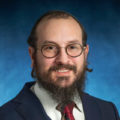
Avi Rosenberg, M.D., Ph.D.
Director, Division of Autopsy Pathology
Assistant Professor of Pathology
Division of Kidney-Urologic Pathology
Avi received his M.D. and Ph.D. degrees from Stony Brook University following doctoral research performed at Cold Spring Harbor Laboratory in the Laboratory of Senthil Muthuswamy. He pursued post-graduate clinical training in Anatomic Pathology in the Laboratory of Pathology at the NIH and fellowships in renal pathology (Johns Hopkins) and Pediatric pathology (Children’s National Medical Center). Avi joined the faculty of The Johns Hopkins University School of Medicine in 2017 and is currently an Assistant Professor in the Division of Kidney-Urologic Pathology on the medical renal pathology service.
Avi has a strong and active research program, with broad funded collaborative research studying primary diseases of the kidney (i.e., FSGS), secondary autoimmune processes of renal significance (i.e., lupus), renal parenchymal fibrogenesis and placental dysfunction (preeclampsia). Most recently, with the COVID-19 pandemic, he co-directed the MITZVA study, which has resulted in several publications exploring the immunology and clinical course observed in ambulatory COVID-19 patients.
Since June 2022, Avi has served as Deputy director for Education in the Division of Autopsy Pathology, channeling his passion for education to improve and create new educational opportunities for residents on the autopsy service. As Director of Autopsy Pathology, Avi will continue to grow and improve the autopsy service through a commitment to all the institutional missions of clinical care, research scholarship and education. Avi will also continue to participate in the diagnostic renal biopsy service.
Sultan Pehlivan, M.D.
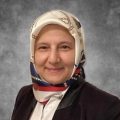
Sultan Pehlivan, M.D.
Postdoctoral fellow
Sultan was born and raised in Denizli, Turkey. She attended Eskisehir Osmangazi University School of Medicine in Turkey, where she obtained her MD degree.
After completing her medical degree, Sultan pursued an anatomic pathology residency at Firat University School of Medicine. During her residency, she conducted research on the expression of human telomerase reverse transcriptase in colorectal tumors and its correlations with immunohistochemical expression and clinicopathologic features.
Sultan worked in various hospitals and forensic medical centers as a pathology specialist in Turkey. During her time at a forensic medical center, she pursued a forensic biology PhD program at the Forensic Science Institute in Ankara University, Turkey. Her doctoral thesis focused on the identification of hypoxia and oxidative stress gene expressions in human cardiomyocytes exposed to hypoxia/reoxygenation.
Sultan moved to the United States and worked as a researcher at New York University (NYU). Subsequently, she started a postdoctoral fellowship in the autopsy division of the Johns Hopkins University School of Medicine (JHU SOM) pathology department in 2023.
Sultan has a clear career path ahead. She intends to pursue training in Anatomic and Clinical Pathology (AP/CP) in the United States. Furthermore, she plans to specialize in cardiovascular and lung pathology.
Jowaly Schneider
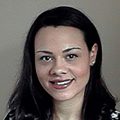
Jowaly Schneider
Study Coordinator
Jowaly has worked for Johns Hopkins since 2014 starting as a laboratory technician before transitioning to her current role as study coordinator for the Research Autopsy Program. In her current role she communicates with families, clinicians, funeral homes and other medical staff to aid in enrollment and logistical coordination of participants in the program. She also assists in the autopsy suite when cases are performed including organization and collection of sampling, logging, dissection and distribution of samples to researchers.
Katie Flickinger, MS, PA (ASCP)cm
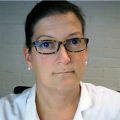
Katie Flickinger, MS, PA (ASCP)CM
Supervisor, Autopsy Pathology
Katie is a Pathologists’ Assistant at The Johns Hopkins Hospital, where she has been the supervisor of the Autopsy Pathology Department for more than 20 years. She earned dual B.S. degrees in Veterinary and Animal Sciences and Cellular and Molecular Biology from the University of Massachusetts- Amherst, then later earned her M.S. in Pathology from the University of Maryland Pathologists’ Assistant Program.
Lauren Nerotto, MS, PA (ASCP)cm
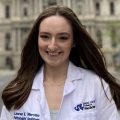
Lauren Nerotto, MS, PA (ASCP)CM
Pathologists Assistant II
Lauren E. Nerotto, M.S., PA (ASCP)CM received her Bachelor of Science from the University of Delaware in Medical Diagnostics and her Master of Science from Drexel University College of Medicine in Pathologists’ Assistant studies. She currently works at The Johns Hopkins Hospital in the Autopsy Pathology Department as a Pathologists’ Assistant teaching the pathology residents about the autopsy service.
Alex Meadows
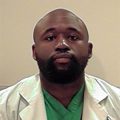
Alex Meadows
Autopsy Technician
Alex has worked in the Autopsy Pathology Department as an Autopsy Technician since 2014. He also works part time in the Histology Lab.
Pamela Learman

Pamela Learman
Autopsy Medical Records Coordinator
Pam was born and raised in Amherst, NY and was class of 1977. She lived in Colorado for 2 years before attaining an AAS degree in Medical Assisting at Erie County Community College in 1994. After living in Florida for 5 years Pam moved to Maryland in 2001 and has been employed at Johns Hopkins Hospital for 16 years and has held the position of Autopsy Records Coordinator for 15 years. Pam is blessed with a wonderful daughter and their wife who live close by. Pam enjoys being home, is an avid reader, crossword puzzle solver and cat lover.
Support Our Research
Your tax-deductible contributions are used exclusively to help cover costs including transportation of the patients from home and hospice to Johns Hopkins, laboratory equipment and supplies, and staff salaries.
Your support to our program not only aids in critical cancer research but also assists in carrying out the final wishes of our extraordinary patients and their loved ones. Every contribution helps us in our mission to help improve the lives of patients with cancer and finding cures.
Donate By Mail
Mail a check payable to "Johns Hopkins University" to:
Research Autopsy Program Fund
Department of Pathology
Johns Hopkins Medicine
500 North Broadway
Baltimore, MD 21205
Donate Online
To donate online using a credit card or electronic check, please click here and select the "Research Autopsy Program Fund." Complete your donation information, and click "Submit." The online giving form may open in a new browser window. This is a secure site where all donations to the Department of Pathology at Johns Hopkins are collected.
Johns Hopkins University is a 501(c)3, non-profit organization. Gifts to our institution are tax-deductible.
If you have any questions about how you can help support our work at Johns Hopkins, or would like to make your contribution through a gift of securities or other method, please contact our Development Office at 443-287-4749.
Mail a check payable to "Johns Hopkins University" to:
Research Autopsy Program Fund
Department of Pathology
Johns Hopkins Medicine
500 North Broadway
Baltimore, MD 21205
To donate online using a credit card or electronic check, please click here and select the "Research Autopsy Program Fund." Complete your donation information, and click "Submit." The online giving form may open in a new browser window. This is a secure site where all donations to the Department of Pathology at Johns Hopkins are collected.
Johns Hopkins University is a 501(c)3, non-profit organization. Gifts to our institution are tax-deductible.
If you have any questions about how you can help support our work at Johns Hopkins, or would like to make your contribution through a gift of securities or other method, please contact our Development Office at 443-287-4749.
In Memoriam
Spencer Grace
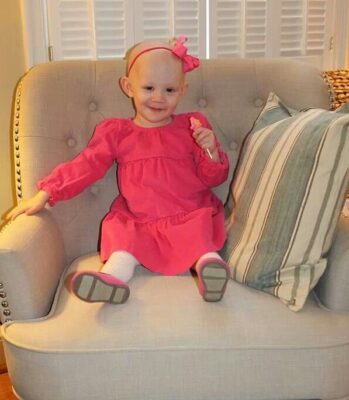
Spencer Grace was diagnosed with a malignant brain tumor, medulloblastoma, when she was 17 months old. Despite the devastating news, Spencer’s original prognosis was good and treatments were proving to be successful. In fact, after 9 months of chemotherapy, there was no evidence of disease and she was in remission. 6 short months later, however, an MRI showed that there was new tumor growth on her brain and spine, and her doctors recommended that she immediately start a more aggressive treatment plan. Although her new tumors initially reacted well to the stronger chemotherapy, we received the news on Spencer’s 3rd birthday that chemotherapy was no longer effective and her tumors were rapidly spreading. It was confirmed that she could not be cured. Facing the reality that your child will not survive is all parents’ worst fear. We were overcome with grief, but also vowed to do anything possible to help other children and families fighting this terrible disease. We learned from Spencer’s doctors that Johns Hopkins Hospital has a Legacy Gift Rapid Autopsy Program through which tumors from terminally ill patients can be donated posthumously for research purposes. Live tumor cells are invaluable to researchers and are the best way to understand and better treat these diseases. Thus, we made the difficult decision to donate Spencer’s tumors to science following her passing with the hope that her case will lead to better treatments and, one day, a cure.
Through the donation of Spencer’s tumors and funds raised by our charity, The Spencer Grace Foundation, we have helped support ongoing medulloblastoma research conducted by doctors at Johns Hopkins. Their research continues to show great promise and we are hopeful that one day it will help save the next generation of children like Spencer. We find comfort and strength in knowing that Spencer’s legacy will live on through her tumor donation, and that she is giving other children a better chance to live as they truly deserve. As Spencer’s parents, it is our sincere hope that Spencer’s story will inspire others to consider donating.
Tyler Farmer
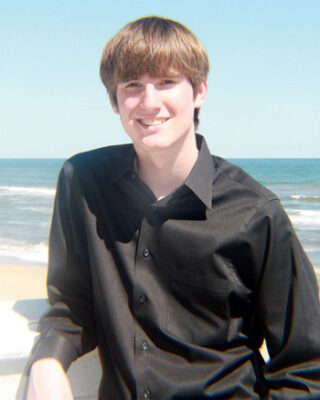
In early 2015, Tyler Farmer began experiencing pain in his left shoulder. A college student, he got an MRI during spring break, thinking he had torn something in his shoulder. Instead, he learned he had a large tumor in his shoulder, which was later diagnosed as osteosarcoma.
Tyler immediately began chemotherapy but soon learned that the tumor was not responding to treatment. In June 2015 Tyler made the brave decision to amputate his left arm, in hopes of stopping the cancer. After months more of chemo, Tyler was declared cancer free.
Despite the loss of his left arm and lingering effects of chemotherapy, Tyler began rebuilding his life. He returned to college at Towson University in January 2016 and moved into his own apartment in August 2016. Despite the challenges he faced, Tyler was determined to lead a positive and independent life.
In December 2016, Tyler received the dreaded news that the cancer had returned, this time in his chest. Tyler had surgery and began an Phase II clinical trial. But in March 2017, additional cancer was found, this time next to blood vessels in his heart that prevented surgical removal. Tyler bravely decided he would no longer pursue treatment and entered hospice care. Tyler died at his home, with his parents Greg and Tammy, on October 8, 2017.
Tyler felt strongly that he had benefited from others who had suffered the cruelty of cancer, but had contributed to cancer research. He felt he had a responsibility to contribute as much as possible to science, so hopefully others diagnosed with this terrible disease could benefit. Through the Legacy Gift program, Tyler was able to donate cancer tissue to not only the Legacy Gift tissue bank, but also the Children's Oncology Group, the National Institutes of Health, the Children's Cancer Therapy Institute, and the Texas Tech Cancer Center.
Tyler is remembered by his family and friends as a brave soul who cared deeply for others. He hopes his contributions to cancer research will inspire others to consider how they can contribute as well. Despite his many adversities, Tyler maintained a positive attitude.
You will be missed but never forgotten, Tyler.
Barry Johnson
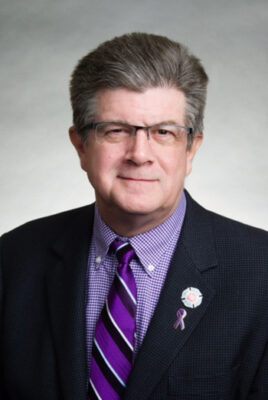
Barry Johnson, a long time Maryland resident, was diagnosed with a pancreatic cancer in November of 2014 - stage 2B. One evening, he had severe abdominal pain and itching - so severe that as an EMT he asked to be taken to the emergency room. A tumor was found on CT. He and his family immediately came to The Johns Hopkins Sol Goldman Pancreatic Cancer Research Center to receive evidence based care from the multidisciplinary care team. Barry started a three to four phase treatment plan of chemotherapy (5FU), stereotactic radiation, traditional Whipple and then 3 more months of chemotherapy. During this time he continued to work full time as an accessibility web programmer/ analyst. By working remotely and through webcasts, Barry was able to continue to help bridge technology capabilities for everyone with different abilities. Barry also continued to volunteer as an EMT / Firefighter in Prince George's County and provide technical expertise to the Maryland State Firemen's Association web and Facebook presence.
While there are many possible contributing factors to Barry's Pancreatic Cancer, he believed that the fire training he participated in during 1980's and the practices of not washing gear and not keeping self-contained breathing apparatus on after flames were out was a significant cause of his "fire fighter cancer". Barry is the third firefighter from Baltimore County Providence VFD to be diagnosed with this aggressive disease. He worked closely with the Maryland Firefighter Cancer Support Network to educate the current generation of providers about the risks of cancer and the important steps to take to decrease risks for many types of cancer.
Barry was in remission for only three months, PC came back in both his liver and lungs - stage 4. The team at the Johns Hopkins started a new chemotherapy regime and in August suggested an immune therapy trial at NIH. Barry tried two more types of chemotherapy while battling the side effects of treatment and complications from surgery. In April of 2017, 30 months after diagnosis Barry died in hospice care surrounded by family. He had three final wishes: 1) to donate his tumors to Hopkins research through the Legacy Rapid Autopsy Program to continue the fight to Wage Hope against Pancreatic Cancer; 2) to have a fire department memorial service (and friends from across the state came in the "sea of blue"); and 3) bagpipes. We will carry on his desire to Wage Hope with both Baltimore PanCan Network and Firefighter Cancer Support networks.
Rest easy Barry, we have it from here and will continue to answer the calls.
Alexandra Marie Lebovic
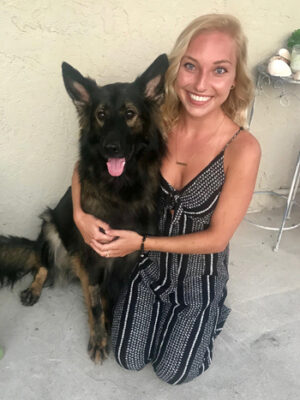
Alexandra Marie Lebovic passed away February 6, 2019 after a four-year battle with Ewing's Sarcoma. She was 23 years old. Alex made the most of her 23 years. She had a passion for life that included travel, learning, adventure and animals. Her lifelong dream was to become a veterinarian.
A former resident of Bel Air, MD, Alex graduated from Patterson Mill High School in 2013 where she was a four-year member of the track and field team, a three-year member of the field hockey team, a four-year member of the orchestra and a member of the French National Honor Society and the Tri-M Music Honor Society.
Upon graduation from Patterson Mill, Alex was accepted into the Animal Science program at the University of Maryland in College Park. She enjoyed an active academic and social life as a member of the Dean's List, Primannum Honor Society, Terps for Animal Welfare and the Delta Delta Delta sorority. She also worked at Hyattsville Animal Hospital to gain experience for her veterinary career.
As a junior at University of Maryland, Alex was diagnosed with Ewing's Sarcoma - a rare form of cancer that affects bones and soft tissue. In Alex's case, the main tumor site was her left femur. There was also a small nodule in her left lung. In the middle of her junior year, she was told, "You have metastatic Ewing's Sarcoma. The five-year survival rate is 30 percent."
With her new puppy, Dakota by her side, Alex endured months of chemotherapy, followed by surgery to remove most of her left femur, followed by more months of chemotherapy, followed by radiation. Throughout this grueling treatment, Alex remained enrolled in the University of Maryland. She took classes online during the spring and summer semesters. She and Dakota returned to campus in the fall of 2016, going to classes in the morning and Johns Hopkins Hospital in the afternoon for chemotherapy and radiation.
She was declared cancer-free in the fall of her senior year. She returned to work at Hyattsville Animal Hospital, worked as a research assistant for one of her professors, interned at the National Institute of Health, completed her studies and graduated with her classmates in May of 2017.
Because of her illness, Alex missed the application deadline to start veterinary school in the fall of 2017. She identified her top choice as University of Florida and moved with Dakota to St. Petersburg in August to establish Florida residency for 2018. Alex spent the year enjoying everything Florida had to offer and working as a veterinary nurse at Northeast Animal Hospital in St. Petersburg. She was accepted into the University of Florida College of Veterinary Medicine's Class of 2022 in May of 2018.
Just weeks before Alex was to start vet school, her cancer recurred. She was encouraged by her family and her doctors to put off vet school and focus on cancer treatment, but she insisted on moving forward. She finished 18th in her class at UFCVM last fall in spite of starting chemotherapy two weeks before the semester, taking a two-week break to have a tumor the size of a grapefruit removed from her leg, enduring radiation treatments for the second half of the semester and, before her last exams, being hospitalized for a week because she was in so much pain all she could do was lie in bed and cry. Two days after taking her last exam, she returned to Maryland where the doctors at Hopkins told her she would lose her battle.
Alex was a remarkable young woman - kind, compassionate, smart, determined, adventurous and beautiful. She was taken from this world too soon. Her family is determined that her name and spirit will live on and are in the process of forming a foundation to support causes Alex loved.
Ralston Eric Fraser
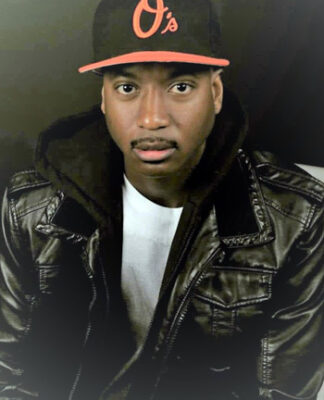
In 2005, at age 23 Ralston Eric Fraser suffered a grand mal seizure while on his way home from work and was rushed to Medstar Georgetown University Hospital, where a large tumor was found on the left temporal lobe of the brain. He underwent surgery to remove the tumor which was determined to be Atypical Teratoid Rhabdoid Tumor (ATRT). Although the prognosis was grim, he remained positive and hopeful that he would beat cancer. He was accepted in a clinical trial at National Institute of Health, Bethesda MD where he received radiation, oral and intravenous chemotherapy and remained cancer free for 14 years.
In January 2019, he started having headaches and loss of his peripheral vision in his right eye. He returned to Medstar Georgetown and underwent surgery to remove two tumors. He participated in a clinical trial at NIH using nivolumab/opdivo to shrink or slow the growth of the tumors. After a month, the MRI showed that the tumor was growing rapidly and his participation in the program ended. He met with the Oncologist at the Lombardi Cancer Center Medstar Georgetown on 5/3/19 and was scheduled to begin intravenous chemotherapy on 5/10/19; however, he did not begin treatment as he was readmitted in the early morning of 5/4/19 because of excruciating headaches. The MRI showed that the tumors were growing rapidly and after consultation the Neurosurgery and Oncology teams determined that additional surgery and chemotherapy would not be beneficial. Ralston made the decision to go home with hospice care. He died at home on 5/21/19 at 3:58 am surrounded by his family.
Ralston was a loving, caring, compassionate and selfless young man. This caring selflessness was what lead him to decide to donate his organs to science in hopes that it will lead to a better understanding and possibly a cure for brain cancer.
Ralston graduated from High Point High School, Beltsville, MD and attended Lincoln Technical Institute where he studied automotive technology. His interests included playing basketball, cooking and working on cars. His plan was to open his own auto repair shop in the near future. He leaves behind family and friends to cherish his memory.
Sleep well my son until we meet again.
Jonathan David Lee Robinson
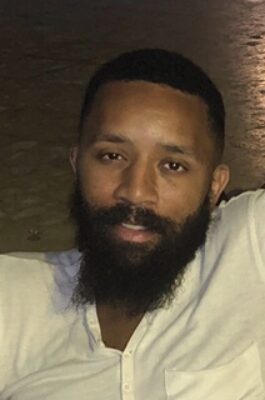
Jonathan was raised in Prince George's County, Maryland. He was remarkably intelligent, funny, empathetic, and charismatic. He earned a bachelor's degree from North Carolina Central University and master's degree from George Washington University. He enjoyed trying and learning new things, traveling the world, watching sports, and spending time with friends and family. He approached life with enthusiasm, positivity, and endless gratitude. In 2011 he moved to Los Angeles, California. While living in LA, he worked for notable organizations, including UCLA, Disney, and Honda.
It was also while living in LA in 2015, that he began experiencing respiratory symptoms, but was repeatedly misdiagnosed with walking pneumonia until 2016. In April 2016, three masses were found in his lungs and testing revealed lung cancer. That month, Jonathan immediately moved home to Maryland and began treatment at Johns Hopkins for small-cell lung cancer, receiving chemotherapy and radiation. He was hopeful and encouraged that because he was young (31 years old), in good physical condition, and a fighter that he would win his battle with cancer.
In 2017, Jonathan was hospitalized for a pulmonary embolism in his right lung. Additionally, his cancer metastasized to his collarbone. He underwent radiation and chemotherapy. Approximately six months later, his cancer metastasized to his femur. He underwent additional radiation and chemotherapy. Throughout his journey, Jonathan remained positive and optimistic. He believed the longer he lived, the longer there was to find a cure.
In March 2019, Jonathan began experiencing severe back pain, which we now know was related to his cancer. This pain only worsened as time went on. In July 2019, the masses in his lungs grew and his cancer was deemed no longer stable. In August 2019 he participated in an immunotherapy clinical trial, which was unsuccessful. Consequently, he was hospitalized for three weeks from September to October 2019 with life-threatening pneumonitis.
In November 2019, he received radiation for the cancer in his left lung, which was growing and interfering with his airway. By December 2019, his cancer had spread to his liver, pancreas, and adrenal gland. He started chemotherapy that same month, but was hospitalized from December 19, 2019 to January 1, 2020, again with life-threatening pneumonitis. On January 13, 2020, his oncologist told him there was no treatment he was strong enough to endure or that his doctor believed would extend his life. Jonathan never wanted to stop fighting, so he asked to restart one of his previous chemotherapy drugs. The entirety of his journey, Jonathan remained positive and strong. He never complained or felt sorry for himself and was determined to beat/survive cancer.
On January 17, 2020, Jonathan sought treatment for excruciating back and hip pain and was hospitalized. Even during the final hours of his life Jonathan wanted to fight and live-asking doctors to forgo any pain or therapeutic medications that might result in his breathing becoming compromised. Despite all of his pain and suffering, Jonathan never complained and more than anything, he wanted to live. Devastatingly, on January 23, 2020 surrounded by loved ones, Jonathan passed away in the hospital at the age of 35. Jonathan wanted to donate his body to the Rapid Autopsy program so he could continue the fight to find a cure for small-cell lung cancer. In this way and so many other ways, his strength and spirit continue to live on. He was so very loved and will be missed by family, friends, and loved ones every single day forever.
Karen Draper
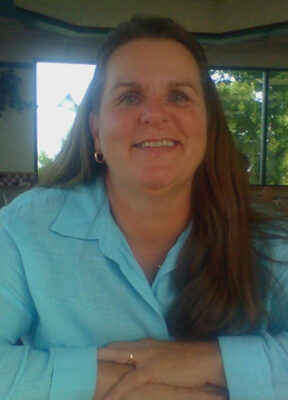
Karen Draper was 62 years old and enjoyed an active, busy life. Karen enjoyed estate sales, flea markets, the Baltimore Orioles and Ravens, and the Pittsburgh Penguins. She was an accomplished seamstress, an avid reader, and loved being with her family. Having never married, she maintained her home and lawn singlehandedly. She took great pride in the results of the many hours spent in her yard. Karen went for routine colonoscopies and mammograms as well as bloodwork every six months as recommended by her doctor. She got good health reports regularly. In July 2019, her riding lawn mower broke and she had it in for repair. While without it, she used a push mower to cut her grass. Following the first cutting, her legs ached and she figured she must have pulled a muscle. When one leg healed and the other did not, she went to her primary physician who ran standard labs for enzyme counts. The blood tests revealed higher than normal liver numbers and she was sent for a second test. Further testing and scans showed a tumor in her colon and lesions on her liver. She soon learned that it was Stage 4 colon cancer that had metastasized to her liver. The location of her colon tumor, combined with the involvement of her liver, did not make Karen a candidate for radiation or surgery.
With chemotherapy her only option, Karen prepared for it the best she could and continued working throughout the first three rounds. At that time, a CT scan showed that her cancer was resistant and she was referred to Johns Hopkins in hopes of finding an alternative treatment. Johns Hopkins ran multiple mutations and was able to provide only one different course of chemotherapy as a possible cure. Karen endured only two rounds of the second treatment before becoming hospitalized from side effects of the chemo. She made the decision at that time that quality of life was more important than how long she'd live if it were under the current circumstance. After a 10-day hospital stay, Karen's oncologist made a referral to hospice and she went home with a life expectancy of 3-6 months. Just 10 1/2 weeks later, Karen passed away peacefully at her home at the age of 63.
Many times during Karen's illness, she'd say, "I don't know why I'm so weird." and "Why do my tumors have to be squamous?" and "I hope they find a cure." She was able to donate to the Legacy Gifts Rapid Autopsy Program and her donation gave her hope that others would someday be able to be cured when she could not. The staff at Johns Hopkins was nothing but professional, kind, and caring. Karen's family is grateful that her legacy can live on through the research and ongoing developments available at Johns Hopkins and the Legacy Gifts Rapid Autopsy Program. We are all hoping Karen's story can be part of a breakthrough to finding a cure.
Dimitra Diane Sekas-Tow
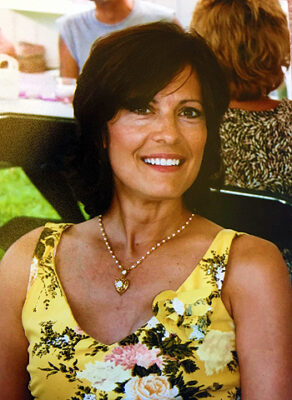
Dimitra Diane Sekas-Tow, 59, of Laurel, Maryland, passed away on November 11th, 2020 after a spirited but arduous battle with pancreatic cancer.
Dee was born on January 12th1961 to George and Litsa Sekas in Washington, DC. After graduating from High Point High School in 1979, she pursued an accounting career, marriage, and motherhood. Dee gave life and unconditional love to her two daughters, Laura and Zoe.
In 2007, she revisited her college career at Howard Community College and University of Maryland, where she achieved a Bachelor of Art degree in accounting and found love.
While at HCC, Dee met Tim, who was absolutely smitten, and they married in June of 2010. Their families were joined and Dee gained an additional son and daughter, Micah and Chelsi.
For years, Dee enjoyed a fruitful accounting career with the wonderful people at Joseph, Greenwald, & Laake, PA, as well as gardening, traveling, sewing, drinking wine, and making her loved ones laugh and smile.
Sara Beth Lewis Mosca
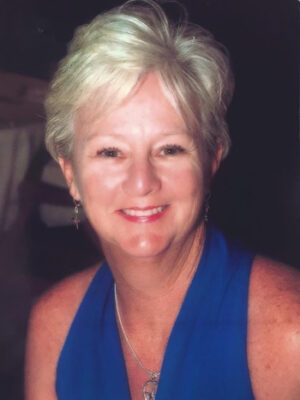
Sara Beth Lewis Mosca was born May 6, 1952 in Charleston, SC and died January 17, 2020 in Pasadena, MD following a valiant battle with Triple Negative Breast Cancer. She was preceded in death by her parents, Sam B. Lewis and Mary Penney Lewis, her sister Mary Virginia (Gina) Lewis and her infant daughter Gina Lynn Mosca. She is survived by her children, Shannon Bethea Mosca, Stephanie Mosca Pingel (Joshua) and John Lawrence Mosca; her grandchildren Olivia and Addison Pingel; her ex-husband, Dr. John J. Mosca, Jr. (Christin); her brother, Sam B. Lewis, Jr. (Jeannie) and her sister, Penney Lewis Stettler and a host of cousins, nieces and nephews.
Beth attended Georgia Southern College and graduated with a B.S. in Nursing from the Medical College of Georgia. She spent much of her career as Office Manager at Pasadena Dental Care and later worked as a Registered Nurse in Labor and Delivery at Harbor Hospital. A Celebration of Life service was held on Saturday, January 25th and was attended by many of her family, friends and former co-workers. The service was led by her brother, Sam B. Lewis, Jr. and included special tributes from her children and 2 of her closest friends. The family is grateful for the outpouring of love and support over the course of her illness. We are especially grateful for the assistance she received during her final 3 months. Beth had a tremendous love for her family and friends and always enjoyed family gatherings. She will be sorely missed by many. She was a Loving, Caring, Generous and Happy person. She has left quite a legacy for all of us. Her final act of selfless, generosity was to donate her body to Johns Hopkins for further Breast Cancer Research.
Linda Gail Bragg
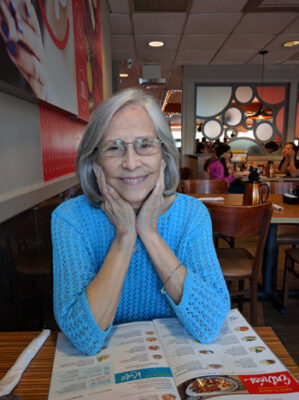
Linda Gail (nee Steeves) Bragg
December 24, 1942 - June 10, 2018
Silver Spring, Maryland
Gail succumbed after a seven-month battle with Cholangiocarcinoma. She was born in Jacksonville, Florida to Richard Steeves and Marjorie (Hull) Steeves and is survived by her husband Gerry, their two children, David M. Bragg (and his partner John Hartford), of Gravenhurst, Ontario, Canada, and Karen E. Craig (husband Doug, and children Dylan, Mitchell, and Addie) of Thousand Oaks, California, and two brothers, Kenneth and Malcolm Steeves. Gail attended Terry Parker High School in Jacksonville, Florida, and received her Bachelor of Science in Nursing from Florida State University. On November 12, 1964 she met Gerry Bragg on a blind date in Brunswick, Georgia, where he was a Naval Aviation Cadet completing advanced training, and four weeks later, on December 12, they were married in Jacksonville, Florida (she always hated for him to tell that story because she was afraid it would make her seem frivolous). After Gerry's first tour in Vietnam, she even agreed to ride with him on a much too small motorcycle from San Diego to the Grand Canyon...and she drove at least a third of the way; although she never got on a motorcycle again. During the next 53 years Gail lived all over the world, as she followed Gerry to his various professional opportunities. One relocation involved raising their young children in Taiwan while he finished his graduate research. The family spent the last 30 years living in West Virginia and Maryland. Gail held various staff and supervisory nursing positions in pediatrics, medical-surgery and orthopedics in hospitals from Key West to Alameda California, and charge nurse in the original Baltimore City Hospital's Burn Center which later became the Johns Hopkins Bayview Burn Center, culminating in her position as Vice-President of Education and Quality Assurance with a nationwide home health care company.
She set a high standard for a loving wife, mother, and eventually a grandmother. Gail loved being by the water, whether walking at the ocean, particularly on the California beaches, or kayaking on the lakes and rivers of the East Coast and on the pristine lakes in Canada near her son's home. She was remarkable for her sense of humor and her open and caring friendships with everyone she met and everyone with whom she worked or mentored. During the last eight years of her life she discovered a new love for ceramic art and eventually served four terms as President of the Leisure World Ceramics Club, where she made many great friends, several of whom helped her cope with her debilitating disease. Gail took great pride in creating unique pieces that are prized by her family, friends, and fellow club members. Her last gift to us all was of herself to the Johns Hopkins Legacy Gift Rapid Autopsy program - a research program that arranges and performs autopsies on an urgent basis to collect tumor and other tissues for researchers in many different areas. Specimens collected at autopsy have been used to grow living cell lines which can be used to evaluate for genetic mutations and test new chemotherapies. Samples can also undergo genetic sequencing and RNA expression analysis, as well as immunohistochemical and proteomic studies. Memorial contributions may be made to the American Cancer Society.
Dave Foster
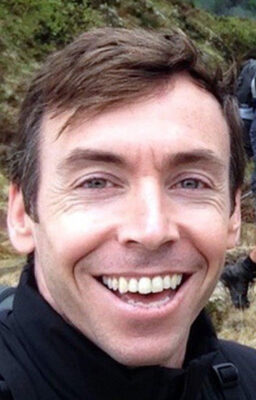
Dave Foster, a native of California, was diagnosed with a brain tumor while working at a job he loved in Dubai in June of 2016. He just thought his eyes were tired from overwork and too much screen time. He and his girlfriend, Sheila, decided to return to the U.S. for treatment at Johns Hopkins because of the institution's reputation and because the family could easily gather nearby for support. Surgery in July showed an aggressive tumor, and the pathology report confirmed a Stage 4 glioblastoma. Dave was young and healthy, and determined to be in the 5% that makes it to the other side of such a diagnosis. He entered a clinical trial at Hopkins that combined nivolumab with radiation and temozolomide. When the tumor progressed, he endured another round of whole brain radiation, but the tumor continued its march, finally claiming Dave's life. He died peacefully at Gilchrist Hospice in Towson, Maryland on June 5, 2017. He was 37.
Dave was a designer by training. He chose to apply his skills to causes and organizations that supported his values by working on projects that helped the environment, contributed to better civil discourse, and helped the poorest people who live and work at the "bottom of the pyramid." He loved being a global citizen, living abroad and experiencing adventure travel, diversity in nature, geography, cultures, and people. He was an avid scuba diver and was deeply concerned about the state of the world's oceans and the environment. Dave is remembered for his kindness, optimism, curiosity, sense of humor, ability to include people, his passion for the earth, and his smile that lit up a room. He was quite simply a lovely man, and he left many, many friends.
Dave's wish was to donate his organs to people who might be able to use them to continue their own lives in better health. Because of the cancer, only his brain was eligible for donation, but he was happy to share it in the hopes that the researchers could learn something from his misfortune that might help others in the future. He hoped his donation would inspire others to do the same.
Rest in Peace, Lovely Man. Your kindness inspires all of us to continue your legacy to "See and Be the Good in the World."
Through Research Autopsy a family is making a precious gift. If your family member was a participant in the Research Autopsy program and you would like to include photographs and text in our memorial section of your loved one, please contact us: [email protected]
FAQs
Will performing an autopsy prevent a viewing at the funeral?
No. A complete autopsy procedure does not touch the face, arms, or legs and will not prevent a viewing from taking place.
How soon after death does the autopsy have to take place?
The goal is to perform the tissue collection within a short interval after death; however, longer intervals do not necessarily mean that useful information cannot be learned from the samples. Research autopsy samples would usually not be taken at an after-death interval of more than 12 hours. It is important, however, that family members not feel rushed in their time with their loved ones after death. Our staff will always want to honor the wishes of our brave and generous families and will work within the times that they need.
Does the family have to pay any fees for a Research autopsy?
No. Costs to perform the case and for transport to the hospital are paid. Families will be responsible for the costs of funeral arrangements after the case is completed.
Who performs the Research autopsy?
The autopsy is performed by a physician trained in the subspecialty of Pathology with experience in performing autopsies in the state-of-the-art postmortem facility within the Johns Hopkins Hospital. They are also assisting staff both as a part of the Research autopsy program and from the participating research laboratories.
Why are there two consents to sign?
The Research Autopsy study consent is signed by the patient themselves if they are capable, and can otherwise be signed by a next of kin prior to death. It allows for sample collection and use of personalized medical information by the researchers. The consent to perform the autopsy itself by law can only be signed after the patient passes away by the closest next-of-kin and not by the patients themselves.
What is the difference between the Research Autopsy Study consent and the Autopsy consent?
The Study Consent must be signed before the patient passes, by the patient or if they are unable, the next of kin. It gives permission for things like genetic testing on the samples that will be taken, tissue banking, and other guidelines. An Autopsy Consent is signed by the legal next of kin to authorize the autopsy procedure itself after the patient passes.
I or my family member have a terminal cancer diagnosis. When is a good time to think about participation in the Research Autopsy program?
It is best to think about participation in the Research Autopsy program before the patient is actively dying so that communication can be set up, questions can be answered, and arrangements can be made for transportation if needed. Though this is ideal, cases have also been performed for patients in the hospital whose families had not considered participation in the program until late in the disease course.
Contact Us
Johns Hopkins University
600 N. Wolfe Street
Pathology B-101
Baltimore, MD 21287
Phone: 410-614-7415
Fax: 410-955-3610
[email protected]

